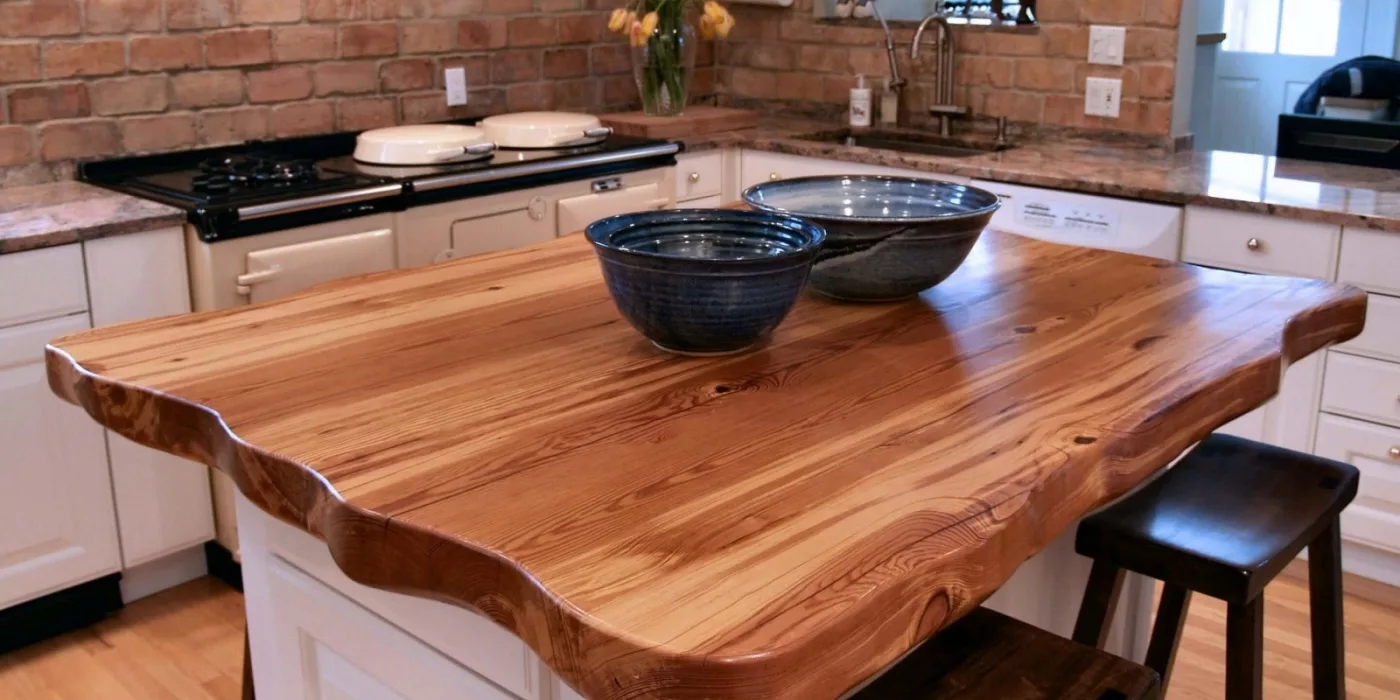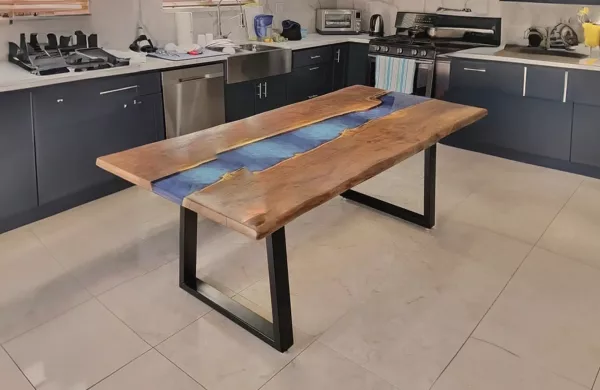Epoxy countertops have emerged as a popular choice in modern interior design, known for their seamless finish and striking visual appeal. These surfaces, created through the application of a resin-based coating, have transformed the way we think about kitchen and bathroom aesthetics. However, as with any material choice, it’s crucial to weigh the pros and cons to determine its suitability for your specific needs. This comprehensive guide aims to provide an in-depth analysis of both the advantages and disadvantages of epoxy countertops. From their unparalleled design versatility and remarkable durability to considerations around heat sensitivity and environmental impact, we will explore the various facets that make epoxy both an attractive and challenging choice for homeowners and designers alike. This balanced examination will equip you with the knowledge needed to make an informed decision about whether epoxy countertops are the right choice for your space.
Main pros of epoxy countertop
Epoxy countertops have become a popular choice for homeowners and designers due to their durability, aesthetic appeal, and versatility. This comprehensive exploration, spanning approximately 1500 words, delves into the main advantages of choosing epoxy for countertop surfaces in various settings such as kitchens, bathrooms, and commercial spaces.
Durability and Resistance
One of the foremost advantages of epoxy countertops is their exceptional durability. Epoxy, a polymer formed from epoxide resin and a hardening agent, is known for its strength and resilience. This durability makes it an ideal choice for areas that experience frequent use or heavy wear.
Impact Resistance
Epoxy countertops are highly resistant to impacts that can occur in daily kitchen activities. This resilience prevents chips and cracks that commonly affect other countertop materials like granite or marble.
Scratch Resistance
Epoxy surfaces are notably resistant to scratches. This characteristic is particularly beneficial in kitchens where the use of knives and other sharp utensils is frequent. It maintains its smooth surface even under rough use, making it a practical choice for busy kitchens.
Heat Resistance
Epoxy countertops can withstand moderate heat, which makes them suitable for kitchen environments. While not entirely heatproof, they can resist heat better than many other countertop materials, preventing burn marks and heat damage in most typical scenarios.
Aesthetic Appeal
Epoxy countertops are renowned for their aesthetic versatility and ability to mimic other materials.
Customization Options
One of the standout features of epoxy is its limitless customization options. Pigments can be added to epoxy to create virtually any color or effect. This flexibility allows homeowners to match their countertops with any interior design scheme.
Mimicking Other Materials
Epoxy can be crafted to look like more expensive countertop materials such as granite, marble, or quartz. This ability to mimic other materials makes epoxy a cost-effective alternative that still offers a high-end look.
Unique Designs and Patterns
The fluid nature of epoxy before it cures allows for the creation of unique designs and patterns. From swirling colors to embedded objects, the design possibilities are virtually endless, allowing for truly one-of-a-kind countertops.
Cost-Effectiveness
Epoxy countertops are a cost-effective option compared to traditional countertop materials.
Lower Initial Cost
The initial cost of epoxy countertops is generally lower than that of natural stone or high-end synthetic materials. This affordability makes it an attractive option for those on a budget.
Longevity and Low Maintenance
Epoxy’s durability contributes to its cost-effectiveness in the long run. Its resistance to scratches, impacts, and moderate heat helps it retain its appearance over time, reducing the need for costly repairs or replacements.
Easy Repairs
In the event of damage, epoxy countertops can be easily repaired. This ease of repair further adds to their cost-effectiveness, as small chips or scratches can be fixed without the need to replace the entire countertop.
Health and Safety
Epoxy countertops offer several health and safety benefits that are particularly important in kitchen and bathroom environments.
Non-Toxic and Food Safe
Once fully cured, high-quality epoxy is non-toxic and safe for food preparation surfaces. This property makes it a safe choice for kitchen countertops where food handling is frequent.
Mold and Bacteria Resistance
Epoxy is non-porous, which means it does not harbor bacteria or mold. This resistance to microbial growth is crucial for maintaining a hygienic surface in kitchens and bathrooms.
Easy to Clean
The non-porous nature of epoxy also makes it easy to clean. Spills and stains can be wiped away without the need for harsh chemicals, contributing to a healthier living environment.
Environmental Considerations
Epoxy countertops can be a more environmentally friendly option compared to some traditional materials.
Reducing Quarrying
Since epoxy can mimic the look of natural stone, it offers an alternative that reduces the need for quarrying, which can have a significant environmental impact.
Longevity
The durability and longevity of epoxy countertops mean they need to be replaced less frequently than less durable materials, reducing waste over time.
Potential for Recycled Content
Epoxy allows for the incorporation of recycled materials such as glass or metal fragments, contributing to a more sustainable production process.
Versatility and Application
Epoxy’s versatility extends beyond residential kitchens and bathrooms.
Commercial Applications
In commercial settings, such as bars, restaurants, and retail spaces, epoxy countertops offer both aesthetic appeal and the durability needed to withstand high-traffic use.
Outdoor Use
Certain types of epoxy are suitable for outdoor use, providing a durable and attractive option for outdoor kitchens and bars.
Creative Applications
Beyond countertops, epoxy can be used for other creative applications such as tabletops, flooring, and artistic projects, showcasing its versatility as a material.
Main cons of epoxy countertop and how to deal with them
Epoxy countertops, while popular for their aesthetic appeal and durability, come with a set of challenges that homeowners and designers should consider. This comprehensive analysis, covering approximately 1500 words, will discuss the main drawbacks of epoxy countertops and offer practical solutions to address these issues.
Sensitivity to Heat
One of the significant limitations of epoxy countertops is their sensitivity to high temperatures.
Heat Damage
Epoxy surfaces can suffer damage when exposed to high temperatures. This can be a concern in kitchens where hot pots and pans are common.
Solution: Use trivets or heat-resistant mats to protect the surface from direct heat exposure. Educating users about the heat limitations of epoxy countertops can prevent accidental damage.
Potential for Yellowing
Epoxy countertops, especially those with lighter colors, can yellow over time due to UV exposure.
UV Sensitivity
The chemical composition of epoxy makes it susceptible to UV light, leading to discoloration or a yellow tint, particularly in areas exposed to sunlight.
Solution: Opt for UV-resistant epoxy formulations or apply a UV-resistant topcoat to protect the surface. For installations in sunny areas, consider using window treatments to limit direct sunlight exposure.
Installation Challenges
The process of installing epoxy countertops can be complex and requires precision.
Professional Installation
Epoxy installation is a specialized process that typically requires professional expertise. Incorrect mixing or application can lead to subpar results.
Solution: Hire experienced professionals for installation. Look for contractors who specialize in epoxy countertops and have a portfolio of successful projects.
Time-Consuming and Messy Process
The installation and curing process of epoxy can be time-consuming and may involve a significant amount of mess.
Solution: Plan the installation timeline carefully and prepare the workspace adequately to minimize disruption and mess. Ensure good ventilation during the application and curing stages.
Durability Concerns
While epoxy is generally durable, it has certain vulnerabilities.
Scratch and Impact Limitations
Despite being resistant to minor scratches, epoxy can still be damaged by sharp objects or heavy impact.
Solution: Use cutting boards and avoid dropping heavy objects on the surface. Regular maintenance and careful use can prolong the lifespan of the countertop.
Repair Complexity
While minor damages can be repaired, fixing major flaws in epoxy countertops can be challenging and may require professional intervention.
Solution: For minor scratches or chips, DIY repair kits can be effective. For significant damages, consult with a professional to assess the best course of action.
Aesthetic Limitations
Epoxy countertops might not suit everyone’s taste or design needs.
Synthetic Appearance
Some homeowners may find epoxy countertops to have a more artificial look compared to natural stone or other materials.
Solution: Carefully select colors and finishes that complement your interior design. Experiment with different pigments and techniques to achieve a more natural look.
Design Inflexibility
Once the epoxy has cured, changing the color or pattern is not feasible without complete replacement.
Solution: Invest time in the design phase to ensure the chosen style aligns with long-term aesthetic preferences.
Chemical Sensitivity
Epoxy countertops can be sensitive to certain chemicals, which might limit cleaning options.
Harsh Chemicals
Strong cleaning agents can damage the epoxy surface, leading to dullness or other forms of deterioration.
Solution: Use gentle, non-abrasive cleaners specifically recommended for epoxy surfaces. Regular cleaning with mild soap and water is usually sufficient.
Environmental and Health Concerns
The manufacturing and installation of epoxy countertops can pose environmental and health concerns.
VOC Emissions
Epoxy resins can emit volatile organic compounds (VOCs) during the curing process, which may affect indoor air quality.
Solution: Opt for low-VOC or VOC-free epoxy products. Ensure proper ventilation during installation and curing to minimize exposure to VOCs.
Sustainability
The production and disposal of synthetic resins like epoxy can have environmental impacts.
Solution: Consider the environmental footprint of epoxy and explore eco-friendly alternatives if sustainability is a primary concern. Look for epoxy products that incorporate recycled materials.
Cost Considerations
While epoxy countertops can be cost-effective compared to some materials, they can still represent a significant investment.
Higher Initial Costs
Compared to basic countertop materials, the initial cost of epoxy, especially high-quality or customized options, can be higher.
Solution: Balance the initial investment against the long-term benefits, such as durability and low maintenance needs. Plan your budget to accommodate the higher upfront cost for a quality installation.
Conclusion
Epoxy countertops, with their unique aesthetic and functional benefits, also come with a set of drawbacks that include sensitivity to heat and UV light, installation challenges, durability concerns, aesthetic limitations, chemical sensitivity, environmental and health concerns, and cost considerations. By understanding these issues and implementing the suggested solutions, homeowners and designers can make informed decisions and effectively manage the limitations of epoxy countertops in their projects.









